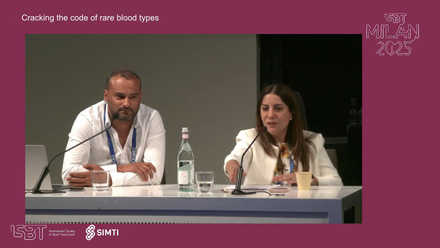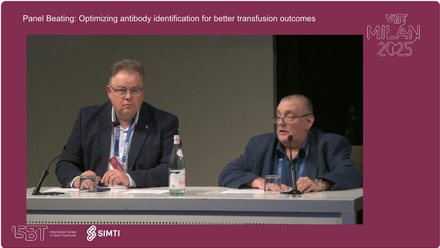The Fetal Maternal Immunology session included the following presentations:
1. Cecile Toly-Ndour: Rh disease prevention for women with partial D: is routine antenatal anti-D prophylaxis useful?
2. Mees Bruin: Natural course of pregnancies with alloantibodies against human platelet antigen HPA-1a
3. Renske van 't Oever: Natural course of hemolytic disease of the fetus and newborn after pregnancy with intrauterine transfusions
4. Jonas Lowack: HLA class I antigen knock out endothelial cells, a tool for the detection of endothelial-specific anti-HPA-1a alloantibodies
5. Xueyu Jiang: Pre-administration of baicalin inhibits red blood cell immunization in a mouse model of red blood cell transfusion
6. Ellen van der Schoot: Fetal RHD genotyping by droplet digital PCR for D variant mothers or children
MODERATORS: Agneta Wikman, Alan Lazarus
After the presentation, there was a questions and answers session, which is also included in the recording.
Abstract
Fetal RHD genotyping by droplet digital PCR for D variant mothers or children
C van der Schoot1, A Ait Soussan1, H Woortmeijer2, C Folman2, M de Haas2, B Veldhuisen1
1Experimental Immunohematology, Sanquin Research, 2Diagnostic Immunohematology, Sanquin Diagnostic Services, Amsterdam, Netherlands
Background: For foetal RHD genotyping, we perform multiplex PCR for RHD exon 5 (negative for RHD*pseudogene(Dψ)) and exon 7 with cell-free DNA isolated from plasma of serologically D negative pregnant women. The test result is used to guide antenatal prophylaxis or in case of RhD alloimmunisation to identify foetuses at risk for haemolytic disease of the foetus and newborn.
The majority of D negative mothers have a complete deletion of the RHD gene and therefore only foetal RHD PCR signals can be detected. However, in case of a maternal variant RHD gene, the foetal RhD prediction may be hampered by the presence of maternal RHD sequences. The most frequently occurring variants are Dψ in mothers from African origin and DVI type 2 in mothers from European origin. In these cases only exon 5 is available for foetal RHD prediction.
Aims: To improve applicability and accuracy of foetal RHD typing in women carrying the most frequently occurring RH variants.
Methods: We developed four different ddPCRs: exon 4 specific for c.577G/c.602C, exon 4 specific for c.577G/c.609G, exon 5 specific for c.654G/c.1048G and exon 7 specific for c.960G/1048G. With these assays we can discriminate DVI mothers (only maternal signal exon 7) from Dψ mothers (maternal signal exon 4:c.602 and exon 7). More importantly, in these mothers foetal RHD typing will be based on two foetal signals (exon 4:c.609 and exon 5). Additionally Dψ or DVI foetuses will be recognised.
The ddPCRs were validated with foetal DNA isolated from maternal plasma gestation week 27–32 with known neonatal RhD typing.
Results: We analysed samples from 21 Dψ pregnant women with five D positive and 16 D negative foetuses; four DVI pregnant women with two D positive and two D negative foetuses and five D negative pregnant women with two Dψ and three DVI foetuses. All results were conform the expected results.
Summary/Conclusions: We developed two new prenatal ddPCR genotyping assays on RHD exon 4. In combination with the exon 5/7 ddPCR we are able to reliably perform foetal RHD typing in mothers and foetuses carrying the most frequently occurring RHD variants RHD*pseudogene and RHD*DVI. The assays can be easily implemented in diagnostics.






















